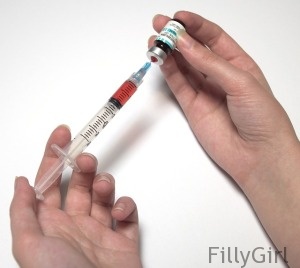On November 18th, the Animal Health Trust (a charity, fighting disease and injury in animals), issued an Equine Flu Alert because of the rise in outbreaks across the U.K. and Scotland. With the onset of winter comes the flu season. When you get your annual vaccine this year, don’t forget about your horse(s).
Vets in the U.K. estimate that 38% of horses are currently vaccinated with outdated virus strains, while the remainder aren’t vaccinated at all. The good news is that all of the horses that were infected this year either weren’t vaccinated at all, or had outdated vaccines. So there’s a strong case to get your horses up to date on their vaccinations and once you do, they should be fine. We’ll talk about the symptoms of Equine Flu and what you need to know about it in a moment, but if you live in the U.K. and suspect that your horse has the flu, you can get free testing from the AHT through their Sentinel Practice Scheme. You can send in samples for free diagnosis by using your equine flu swabbing kits and by taking paired blood samples.
Just because you don’t live in the U.K. it doesn’t mean you shouldn’t worry about the Equine Flu this year. In 2013 (full statistics for 2014 aren’t available yet), according to the OIE (World Organization For Animal Health) Equine influenza was diagnosed in 24 states in the U.S.A.
So what do you need to know about Equine Flu? First and foremost, it’s very contagious. The virus is usually spread through coughing horses and nasal discharge, but it’s also passed on through buckets, feed, water, clothing, brushes, tack, and other equipment. The risk of influenza is higher for young horses compared to older ones. The Equine flu is usually not fatal (rest easy), but the clinical signs can last a few days. With proper care, most equines recover in about 10 days. Some, however, may show symptoms for weeks, especially if put back to
work too soon. If your horse develops complications due to secondary infections (which are common), it may take as much as six months for some horses to regain their full ability.
So what are the signs of Equine Flu? A usual sign is a dry cough. But horses can also experience a raised temperature, nasal discharge, swollen lymph glands conjunctivitis, loss of appetite, and even depression! Yes, all the same symptoms you felt the last time you got the flu.
Can I give my horse the flu? This is a tricky one to answer. Some here at FillyGirl didn’t think it was possible. It turns out, everyone is right, sort of. Huh?? Well research done by Dalva Mancini and his team, who first published their work in the Brazilian Journal of Veterinary Research and Animal Science, revealed high levels of antibodies in horses to two human influenza A strains – H1N1 and H3N2.
About 78% of the horses carried antibodies to two strains of equine flu. But, more importantly, they tested positive in even higher numbers to human influenza A virus – 80.43% for H1N1 and 93.47% for H3N2. Similar numbers had antibodies to type B influenza. That means at some point, the immune systems of the horses recognized the viruses, generated antibodies against the human flu viruses, and did not become sick. Skeptics can stop here and click on the link above for more details.
“And your little dog too” According to the CDC (Center for Disease Control) website, “most recently, H3N8 viruses from horses have crossed over and caused outbreaks in dogs”. So keep Toto away from the stables if there’s a known outbreak in the area. You don’t have to worry about the reverse happening. Dog flu (canine influenza) is caused by influenza A H3N8 virus, which was originally a horse influenza virus that spread to dogs. It was first discovered in 2004. But, now this dog subtype spreads only among dogs.
Now that we can all don white lab coats and fancy ourselves experts on the influenza virus (human and non-human), let’s get back to the bottom line: Go get yourself vaccinated, but more importantly, go get your horse(s) vaccinated first!
Share This:







